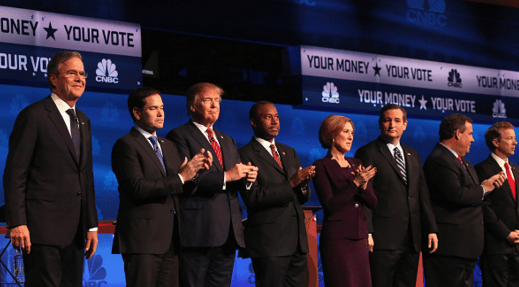CNBC hosted the third Republican debate of the primary season Wednesday in Boulder, Colo. The main debate was between the top 10 highest polling candidates and lasted two hours. Here’s five things you should know about the debate:
1) Rise of the underdogs – Sen. Marco Rubio, Sen. Ted Cruz and Gov. John Kasich gave solid performances and gained a lot more screen time than in pervious debates. Rubio went up against Gov. Jeb Bush on his Senate voting record. Cruz received attention for calling out the “liberal media.” Kasich had the air time to explain his policy positions a little more. Meanwhile, Donald Trump, Ben Carson, and Carly Fiorina lost their usual screen time and attention.
2) Conflict is the name of the game – Several candidates were calling out their competition on past mistakes and policy errors. Kasich questioned the entire GOP field on their tax policies, stating that he is the only candidate with “a feasible tax plan.” Trump took on this criticism, leading to a heated discussion during the first segment. Bush attacked Rubio on his vote attendance record, telling him, “you have to show up to work.” Rubio has been missing Senate votes to run for president. Rubio replied that President Obama missed votes to run as well, but no one called the then-Senator out on it.
3) Taxes and social security are big topics – Taxes dominated a big chunk of the debate. Most of the candidates agree that taxes need to be cut, especially for small businesses. A few candidates – namely Trump and Carson – are proposing plans that would implement a flat tax rate, meaning every person in America would pay the exact same percentage of taxes, regardless of income level. Additionally, almost all of the candidates agreed that social security reform needs to happen, but they disagreed as to how to change the current system. Several candidates stated that there are not enough workers to pay into the system to support the baby boomer generation.
4) Agreement on the role of government – At some point, almost every single candidate said that the federal government is too big. Sen. Rand Paul said he wants the government to be so small that he can’t even see it. Ben Carson said, “the government should not be in every part of our lives.” And, toward the end of the debate, Gov. Chris Christie was shocked that the candidates were discussing the government’s possible role in cracking down on online fantasy football.
5) Attacking the media works for the right – Cruz pleased the audience by calling out the media. He said, “The questions asked so far in this debate illustrate why the American people don’t trust the media. This is not a cage match.” Later, Rubio took his turn. He claimed that the Democrats have the best superPAC, which is the mainstream media. The audience erupted into applause. These criticisms of the media tend to score points with the Republican base, and the candidates took full advantage of that during this debate.









